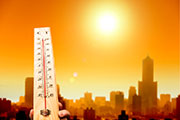- Could Your Grocery Store Meat Be Causing Recurring UTIs?
- Are You Making This Expensive Thermostat Error This Winter?
- Recognizing the Signs of Hypothyroidism
- 10 Strategies to Overcome Insomnia
- Could Artificial Sweeteners Be Aging the Brain Faster?
- Techniques for Soothing Your Nervous System
- Does the Water in Your House Smell Funny? Here’s Why
- Can a Daily Dose of Apple Cider Vinegar Actually Aid Weight Loss?
- 6 Health Beverages That Can Actually Spike Your Blood Sugar
- Treatment Options for Social Anxiety Disorder
Heat Stroke, Kidney Failure Help Drive Illnesses From Extreme Heat


Each year, more than one-third of the more than 10,000 weather-related deaths in the United States occur because of extreme heat conditions, according to recent federal statistics.
Now, a new study finds that heat stroke is the leading cause of heat-related illness among Americans, but other conditions, such as kidney failure and urinary tract infections, also put older people at higher risk for hospitalization when temperatures soar.
The new data should help health care systems anticipate and perhaps prevent many heat-linked illnesses during heat waves, “now and as climate change progresses,” study author Jennifer Bobb, research associate at the Harvard School of Public Health, said in a university news release.
A prior report released in July by the U.S. Centers for Disease Control and Prevention found that certain Americans — people over 75, the poor and minority populations — are especially vulnerable to extreme heat conditions.
“We think deaths from heat are underreported, because people who die during heat waves don’t have their deaths attributed to heat,” Jennifer Parker, a special projects branch chief at the CDC’s National Center for Health Statistics, said at the time the report was released.
In the new study, the Harvard team tracked hospitalizations for 23.7 million Medicare beneficiaries across the country between 1999 and 2010 and compared that with nationwide temperature data.
The results showed that heat stroke posed the greatest risk during heat waves. Older adults were 2.5 times more likely to be hospitalized from heat stroke on extremely hot days than on days with normal temperatures.
But rising temperatures also upped the risk for other dangerous medical conditions, Bobb’s team found. During heat waves, the risk of hospitalization rose 18 percent for fluid and/or electrolyte disorders, 14 percent for kidney failure, 10 percent if they had a urinary tract infection, and 6 percent for sepsis (severe blood infection).
These risks were highest on heat wave days and when heat waves were longer and more extreme.
And the risk didn’t fade as soon as temperatures dipped: The study found that risks for hospitalization remained high for up to five days after a heat wave ended.
Dr. Robert Glatter is an emergency medicine physician at Lenox Hill Hospital in New York City. Speaking at the time of the release of the CDC study, he stressed that “people with chronic medical conditions may not die from the weather itself but from underlying medical problems which compromised their ability to survive in such extreme conditions.”
The Harvard authors point out that, according to the Natural Resources Defense Council, climate change could trigger extreme heat waves that could cause more than 150,000 deaths in the 40 largest U.S. cities by the end of the century.
The study was published online Dec. 23 in the Journal of the American Medical Association.
More information
The U.S. Centers for Disease Control and Prevention has more about extreme heat.
Source: HealthDay
Copyright © 2026 HealthDay. All rights reserved.










